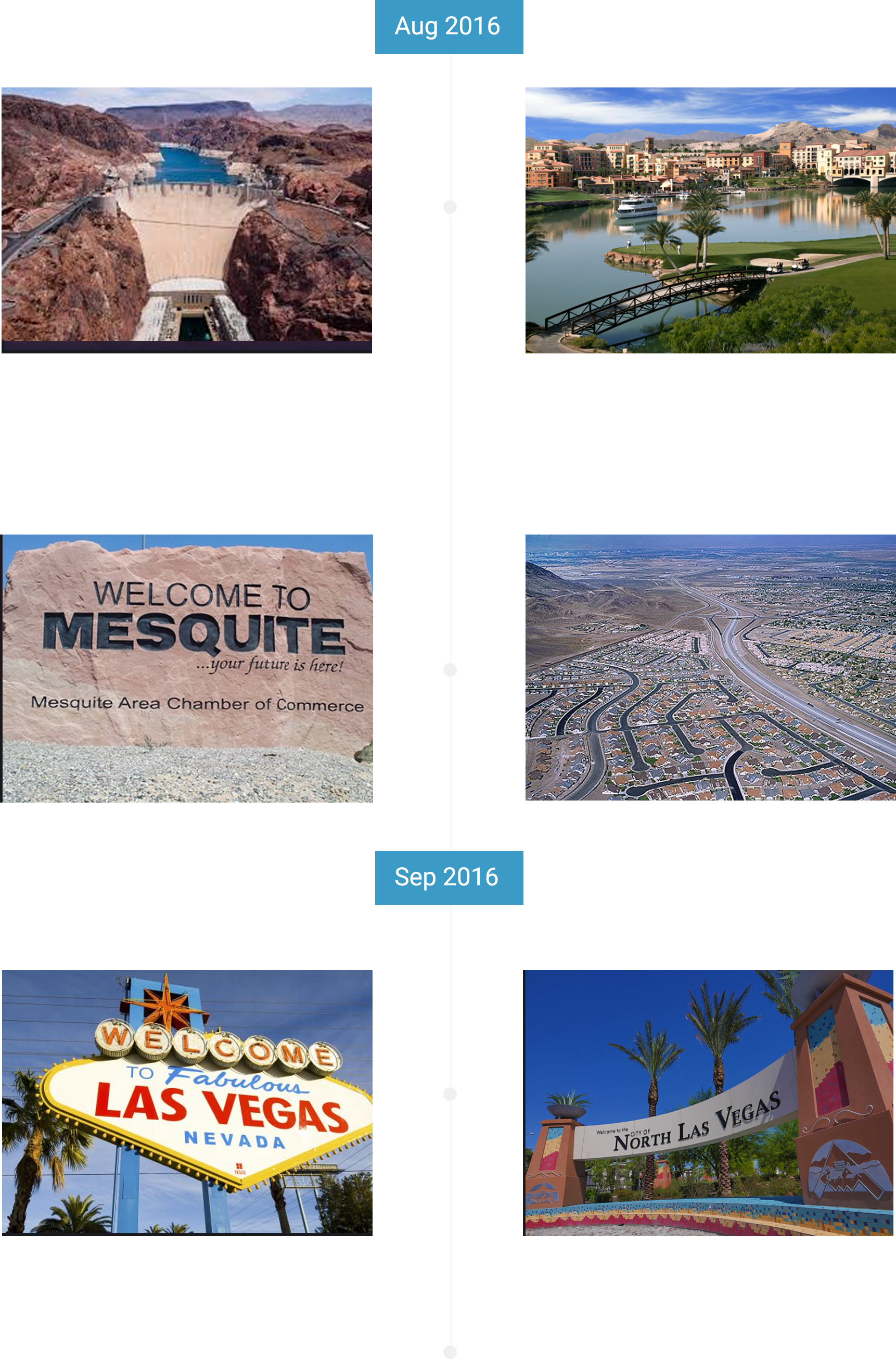Our Transportation.
Our Community. Our Future.
Our Transportation.
Our Community.
Our Future.
Our Transportation.
Our Community.
Our Future.
As the region’s metropolitan transit and transportation planning organization, the RTC strives to be at the forefront in making critical transportation improvements and infrastructure investments for the future of Southern Nevada. Accomplishing this feat requires partnerships with the entire community, including elected officials, business leaders, local governments and public and private organizations.
The RTC’s board of commissioners authorized RTC staff to officially form TRAC in fall 2015. The goal of the committee is to advise the RTC Board of Commissioners and staff on its many critical transportation initiatives. TRAC’s diverse array of stakeholders work together to help ensure that the community has the transportation infrastructure in place to accommodate current and future growth by improving mobility throughout the valley while enhancing accessibility, safety, sustainability and equity.
About the Committee
Who Is TRAC?
TRAC consists of thoughtful leaders and committed citizens who represent large sectors impacted by transportation-related issues and are dedicated to transforming transportation in Southern Nevada and moving our community forward.
In addition, Technical Advisors (TA) comprised of public works directors, the Nevada Department of Transportation, and financial and economic experts provide assistance to the committee, such as reviewing and evaluating transportation plans, proposals and funding structures.
Who is Involved?
TRAC consists of members from a diverse base of stakeholders throughout Southern Nevada that represent large groups of citizens impacted by transportation-related issues.
TRAC complies with the Nevada Opening Meeting Law. Each TRAC meeting is recorded, and meeting summaries are produced to capture discussions and any resulting decisions. These meeting materials can be found at the link below.
|
|
TRAC Phases: Community Outreach and Planning
As of 2024, TRAC has been segmented into six phases based on community needs over the past nine years. Below are the timeframes for each TRAC phase. Please click on the tile to be directed to that phase’s information.
Roadway Planning and Funding
When TRAC began meeting in January 2016, Southern Nevada had identified $6.2 billion worth of unfunded roadway projects, and TRAC was challenged with finding funding solutions to accommodate these unmet needs. TRAC delved into six months of in-depth study of Southern Nevada’s economic forecast, current and future transportation infrastructure priorities, and available funding options. At the conclusion of the committee’s review, TRAC made the following recommendations that were presented and adopted by the RTC board. Many of these recommendations have been completed or are ongoing.
Future Mobility in Southern Nevada
From October 2016 to January 2017, TRAC focused on the second phase of RTC discussions: transit and emerging transportation technologies. TRAC had the opportunity to engage in conversations about the future of transportation mobility and the way it is evolving locally and regionally. Speakers from Los Angeles, San Diego and Phoenix shared their experiences and expertise with transit systems in regions similar to Southern Nevada. They discussed funding hurdles, growth challenges and how best to engage and inspire communities to support overall transportation investments. These discussions played a significant role in TRAC’s final recommendations and were adopted by the RTC board in January 2017.
Many TRAC committee members actively participated and supported key initiatives in the 2017 Legislative Session that helped provide the RTC with the necessary tools to address Southern Nevada’s mobility challenges. Several members also participated in On Board, the RTC’s community comprehensive transit plan to help identify how high capacity transit services, enhancements to the current bus system, and emerging transportation technologies can improve future mobility and accessibility for Southern Nevada residents and visitors.
TRAC meetings resumed in October 2017 for the third phase of RTC discussions. The committee was tasked with focusing on Southern Nevada’s mobility challenges that included learning about current and emerging mobility developments and opportunities, as well as engaging in smart mobility discussions and identifying how these efforts can impact and improve mobility, accessibility, and safety in Southern Nevada. TRAC’s Phase 3 conversations have helped provide meaningful feedback and recommendations on how to best address and prioritize mobility solutions in Southern Nevada.
Transit and Emerging Technologies Recommendations:
Funding Challenges and Potential Solutions
In 2019, TRAC began its fourth phase by focusing on the transit system in Southern Nevada and the funding challenges impacting transit and its financial future. The impacts of ride-share options on transit and other factors had led to a funding gap, forcing the RTC to dip into its reserves in 2020, reevaluate its funding sources, and make significant adjustments to transit options for the community. Following five months of in-depth study of the Southern Nevada transit system, current and future transit demands, and near-term and long-term funding needs, TRAC supported RTC pursuing potential reallocation of existing funds to continue current transit operations and future transit options.
Although COVID-19 disrupted the flow of goals and objectives during 2020, the committee reconvened for Phase 5 in October 2020. During this meeting, the TRAC committee reviewed the effects of COVID-19 on transit as well as streets and highway funding, reviewed the Maryland Parkway project, and previewed the 2021 legislative agenda. There were no formal TRAC recommendations on legislative priorities.
TRAC completed its fifth phase in October 2022, which focused primarily on Southern Nevada’s transit system, including its operations and financial headwinds. More specifically, TRAC reviewed financial shortcomings of the transit system as expenditures are expected to exceed revenues on a go-forward basis. However, the RTC received roughly $300 million of federal stimulus as a result of the COVID-19 pandemic and related response, which has allowed the RTC to shore up financial shortfalls through the 2028 forecast time horizon. Importantly, in the event RTC does not identify an alternative funding solution, the organization will need to begin cutting costs, including potentially reducing transit service, as early as 2024.
Through the help of RTC staff and outside consultants, a list of potential funding alternatives was identified and evaluated in an effort to fill the funding gap for the RTC’s transit operations. However, due to the complexity of Nevada’s tax system, the economic climate and other considerations, no single funding alternative was easily identifiable. TRAC narrowed the list of potential funding alternatives that RTC should continue to evaluate as possible solutions to address funding challenges. Below is a list of the potential fees or taxation that were offered for consideration:
- Alternative Conveyance Fee (Uber, Lyft, Private Conveyance)
- Delivery Fee (Grocery, Food and Parcel Delivery)
- Increased Transit Fees (Residential and Resort Corridor)
- Sales Tax Increase
- Broadened Sales Tax Base (Services Tax)
- Vehicle Surcharge Fee (Registration Fees, Vehicle Type)
- Road Usage Fee
- Congestion Charge (Ride Share, Taxi, All Drivers)
In light of the upcoming 2023 legislative session, TRAC members recommended that RTC staff continue to have conversations and explore potential funding solutions.
Achievements
Fuel Revenue Indexing
TRAC supported the extension of Fuel Revenue Indexing (FRI) as the most viable funding option for roadway projects in Southern Nevada. With the passage of Question 5 in November 2016, FRI will continue through 2026, generating up to $3 billion and creating up to 25,000 jobs to fund and build critical roadway projects serving our community and economy. Through TRAC’s support of FRI and its recommendation for RTC staff to incorporate the top four transportation values into the RTC’s planning processes and prioritization of unfunded projects, high priority projects will be evaluated by the following values:

Safety
Safety projects spread across Southern Nevada including school zone improvements, pedestrian bridges, upgraded crosswalks and pedestrian flashers.

Congestion Management
Congestion management projects including roadway expansion and increased capacity, like Clark County’s widening of the Beltway from six to eight lanes between Pecos Road and Windmill Lane.
Roadway Maintenance
Roadway maintenance projects including pavement repair, sidewalk widening, landscape improvements and filling in sawtooth roads valley-wide.

Connectivity
Connectivity projects including NDOT’s completion of the Centennial Bowl project at the 215 Beltway and US 95.
Southern Nevada Jurisdictions Support TRAC Recommendations
Following TRAC Phase I (Roadway Planning and Funding), committee members briefed local jurisdictions on the committee’s work and received support for their transportation recommendations from elected boards throughout Southern Nevada. Below is the schedule of completed presentations:

Resources
RTC Meetings and Agendas
Resources You Can Use
 |
A high-level list of commonly used acronyms that are present throughout various documents and conversations within the government sector. View RTC Acronym List |
 |
A high-level overview of the Regional Transportation Commission and all of its current programs and initiatives. View RTC 101 |
 |
A high-level overview of Transportation Resource Advisory Committee & Community Collaboration. View TRAC 101 |
 |
A complete list of all Transportation Resource Advisory Committee & Community Members. View Member List |
 |
An overview of the RTC’s current mobility services, programs and partnerships. View Mobility Services Fact Sheet |
 |
A list of definitions for transit funding and financial terms. View Transit Funding and Financial Terms Fact Sheet |
Meeting Presentations
December 3, 2024 – View Meeting Presentation (PDF)
November 21, 2024 – View Meeting Presentation (PDF)
October 23, 2024 – View Meeting Presentation (PDF)
September 26, 2024 – View Meeting Presentation (PDF)
August 29, 2024 – View Meeting Presentation (PDF)
October 13, 2022 – View Meeting Presentation (PDF)
June 2, 2022 – View Meeting Presentation (PDF)
April 28, 2022 – View Meeting Presentation (PDF)
March 31, 2022 – View Meeting Presentation (PDF)
February 24, 2022 – View Meeting Presentation (PDF)
October 22, 2020 – View Meeting Presentation (PDF)
December 5, 2019 – View Meeting Presentation (PDF)
October 3, 2019 – View Meeting Presentation (PDF)
August 28, 2019 – View Meeting Presentation (PDF)
June 27, 2019 – View Meeting Presentation (PDF)
January 31, 2019 – View Meeting Presentation (PDF)
